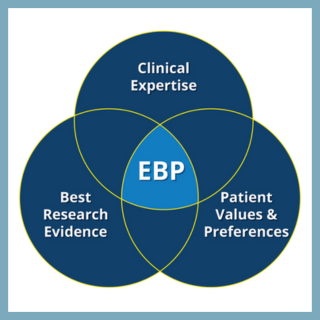Overview of Evidence-based Interventions in ASD

What are EBPs?
- “..a set of practices that have clear evidence of positive effects with autistic children and youth.” - The National Clearinghouse on Autism Evidence & Practice
- Evidence-based practices, also known as EBPs, are strategies that are encouraged in the practice and teaching of individuals with autism due to their strong research and data backing. EBPs can be utilized across all settings including the home, clinic, other therapy sessions and most importantly, in schools.
- The National Clearinghouse on Autism Evidence & Practice has a great resource that lists and describes the current 28 EBPs.
List of the 28 EBPs
Each of the hyperlinks below go to the National Professional Development Center (NPDC) on Autism at University of North Carolina. Each links opens a document (a "brief") that includes information about the EBP including the evidence base for the intervention and an implementation checklist for using the EBP with fidelity.
- Antecedent-Based Intervention
- Augmentative and Alternative communication
- Behavior Momentum Intervention
- Cognitive Behavior/Instructional Strategies
- Differential Reinforcement
- Direct Instruction
- Discrete Trial Training
- Exercise and Movement
- Extinction
- Functional Behavioral Assessment
- Functional Communication Training
- Modeling
- Music-Mediated Intervention
- Naturalistic Intervention
- Parent-Implemented intervention
- Peer-Based Instruction and Intervention
- Prompting
- Reinforcement
- Response Interruption/redirection
- Self-Management
- Sensory Integration
- Social Narratives
- Social Skills Training
- Task Analysis
- Technology-Aided instruction and intervention
- Time Delay
- Video Modeling
- Visual Supports
Each link will open a new web browser.
Missouri Autism Guidelines Initiative
Several publications have been developed as a result of a partnership between the Thompson Foundation for Autism, the Office of Special Education of the Missouri Department of Elementary and Secondary Education, the Division of Developmental Disabilities of the Missouri Department of Mental Health, Mercy Children’s Hospital – St. Louis and Springfield, and members of the Missouri Autism Guidelines Initiative. These documents include the Autism Spectrum Disorders: Guide to Evidence-based Interventions and Autism Spectrum Disorders: Missouri Best Practice Guidelines for Screening, Diagnosis, and Assessment and supporting documentation. More information about the MAGI documents, including how to access copies at no cost, is available on our website.
Mid-Missouri rapid response initiative self-paced, noncredit short course in autism interventions
Free to take online through the Missouri University Extension, the Autism Spectrum Disorders: Evidence-Based Practice and Interventions training was developed by the Mid-Missouri Rapid Response Initiative, which is funded by the Missouri Department of Mental Health, Division of Developmental Disabilities. This online module was created from the training through a partnership with the Thompson Center for Autism and Neurodevelopmental Disorders, University of Missouri Extension, and the Division of Developmental Disabilities, Office of Autism Services.
The National Professional Development Center on Autism Spectrum Disorders online training modules for evidence based interventions
The National Professional Development Center has developed online modules for each of the evidence-based practices identified in their review of ASD interventions. These modules are available on the Autism Focused intervention resources & Modules (AFIRM) website.
The Ohio Center for Autism and Low Incidence (OCALI) online training modules for evidence based interventions
The Ohio Center for Autism and Low Incidence (OCALI) has also developed Autism Internet Modules (AIM) which features content from experts on ASD across the nation on topics including assessment and identification, characteristics, evidence-based practices and interventions, transition to adulthood, and employment. The AIM platform was designed and built by OCALI staff with components consistent with research on how adults learn. Information is presented at a universal reading level with activities providing support to those with introductory or advanced knowledge on ASD.
Featured below is one of a series of videos produced by Project ACCESS to assist with understanding each of the Evidence-Based Interventions. We will provide a different video each month.